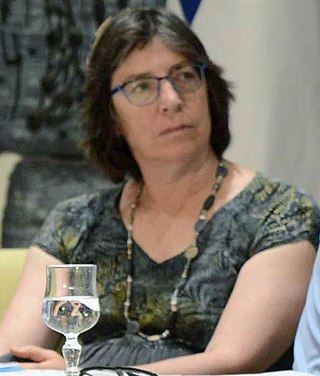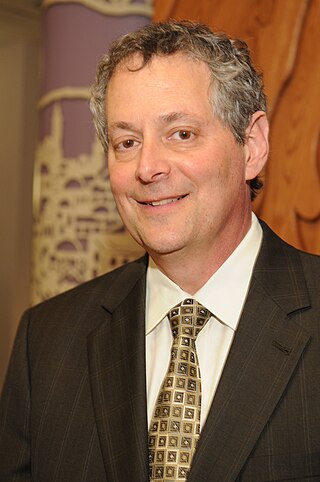Related Research Articles

Conservative Judaism, also known as Masorti Judaism, is a Jewish religious movement that regards the authority of Jewish law and tradition as emanating primarily from the assent of the people through the generations, more than from divine revelation. It therefore views Jewish law, or Halakha, as both binding and subject to historical development. The conservative rabbinate employs modern historical-critical research, rather than only traditional methods and sources, and lends great weight to its constituency, when determining its stance on matters of practice. The movement considers its approach as the authentic and most appropriate continuation of Halakhic discourse, maintaining both fealty to received forms and flexibility in their interpretation. It also eschews strict theological definitions, lacking a consensus in matters of faith and allowing great pluralism.
The subject of homosexuality and Judaism dates back to the Torah. The book of Vayikra (Leviticus) is traditionally regarded as classifying sexual intercourse between males as a to'eivah that can be subject to capital punishment by the current Sanhedrin under halakha.
The Rabbinical Assembly (RA) is the international association of Conservative rabbis. The RA was founded in 1901 to shape the ideology, programs, and practices of the Conservative movement. It publishes prayerbooks and books of Jewish interest, and oversees the work of the Committee on Jewish Law and Standards for the Conservative movement. It organizes conferences and coordinates the Joint Placement Commission of the Conservative movement. Members of the RA serve as rabbis, educators, community workers and military and hospital chaplains around the world.

Women in Judaism have affected the course of Judaism over millennia. Their role is reflected in the Hebrew Bible, the Oral Law, by custom, and by cultural factors. Although the Hebrew Bible and rabbinic literature present various female role models, religious law treats women in specific ways. According to a 2017 study by the Pew Research Center, women account for 52% of the worldwide Jewish population.

The Jewish Theological Seminary (JTS) is a Conservative Jewish education organization in New York City, New York. It is one of the academic and spiritual centers of Conservative Judaism and a center for academic scholarship in Jewish studies. The Jewish Theological Seminary Library is one of the most significant collections of Judaica in the world.

Conversion to Judaism is the process by which non-Jews adopt the Jewish religion and become members of the Jewish ethnoreligious community. It thus resembles both conversion to other religions and naturalization. The procedure and requirements for conversion depend on the sponsoring denomination. Furthermore, a conversion done in accordance with one Jewish denomination is not a guarantee of recognition by another denomination. Normally, though not always, the conversions performed by more stringent denominations are recognized by less stringent ones, but not the other way around. A formal conversion is also sometimes undertaken by individuals whose Jewish ancestry is questioned or uncertain, even if they were raised Jewish, but may not actually be considered Jews according to traditional Jewish law.
The Synagogue Council of America was an American Jewish organization of synagogue and rabbinical associations, founded in 1926. The Council was the umbrella body bridging the three primary religious movements within Judaism in the United States. It included:
The Ziegler School of Rabbinic Studies is the graduate program of study leading to ordination as a Conservative rabbi at the American Jewish University, offering a Masters in Rabbinic Studies degree.
Jewish feminism is a movement that seeks to make the religious, legal, and social status of Jewish women equal to that of Jewish men in Judaism. Feminist movements, with varying approaches and successes, have opened up within all major branches of the Jewish religion.
Paula Reimers (1947–2023) was an American rabbi. In 2008 she was the rabbi of Congregation Beth Israel. However by January 2017 she was no longer listed as that Congregation's rabbi. Reimers was one of the first women to be ordained by the Conservative movement’s Jewish Theological Seminary of America.
The first openly lesbian, gay, bisexual, and transgender clergy in Judaism were ordained as rabbis and/or cantors in the second half of the 20th century.

Naamah Kelman-Ezrachi is an American-born Reform rabbi who was named as Dean of the Hebrew Union College-Jewish Institute of Religion campus in Jerusalem starting in July 2009. In 1992, Kelman made history as the first woman in Israel to become a rabbi when she received her rabbinic ordination from Rabbi Alfred Gottschalk.

Rabbi Albert L. Lewis was a leading American Conservative rabbi, scholar, and author; President of the Rabbinical Assembly (RA), the international organization of Conservative rabbis; and Vice-President of The World Council of Synagogues. In 2009, the award-winning author, Mitch Albom, wrote about Lewis, his childhood rabbi, as the main character in the non-fiction book, Have a Little Faith. The book, hailed as a story of faith that inspires faith in others, concludes with the eulogy that Albom delivered at Lewis's funeral, on February 12, 2008.
The December 2010 Israeli rabbi letter controversy was a scandal that erupted surrounding the appearance of two open letters, signed by a number of Israeli rabbis, that were discriminatory towards non-Jews in Israel. Although the letters sparked considerable outrage, evoking condemnation from prominent Israeli and American Jews and others, a poll showed that 44 percent of Israeli society supported the letters' messages.

Jack Moline is an American Conservative rabbi who retired as executive director of Interfaith Alliance in 2022, having served in the post since January 2015.
Einat Ramon was the first Israeli-born woman to be ordained as a rabbi. She was also the first woman and the first sabra to head a Conservative rabbinical school, specifically the Schechter Rabbinical Seminary in Jerusalem, where she was dean from 2005 to 2009. Since 2011 she no longer identifies as a rabbi, heads the Marpeh training program for spiritual caregivers in Jerusalem, and teaches modern Jewish thought and Jewish feminism at the Schechter Institute.
This is a timeline of women rabbis:
This is a timeline of LGBT Jewish history, which consists of events at the intersection of Judaism and queer people.
Simchah Roth was an Israeli rabbi and a scholar who edited the first prayer book of the Masorti movement. He advocated veganism.
References
- ↑ "A White Plains rabbi replaces a White Plains rabbi as head of the Rabbinical Assembly | Blogging Religiously". Religion.lohudblogs.com. 2008-10-29. Archived from the original on 2016-02-04. Retrieved 2012-07-07.
- ↑ "News Briefs - Sun Sentinel". Articles.sun-sentinel.com. 2008-11-04. Retrieved 2012-07-07.[ dead link ]
- ↑ Rabbinical Assembly – About Us
- ↑ Published: September 10, 2000 (2000-09-10). "WEDDINGS; Julie Schonfeld, Aytan Bellin - New York Times". The New York Times . Retrieved 2012-07-07.
{{cite web}}: CS1 maint: numeric names: authors list (link) - ↑ "10 Women to Watch in 5772: Julie Schonfeld - Aspire - JWM". Jwi.org. 2012-06-07. Archived from the original on 2016-03-04. Retrieved 2012-07-07.
- ↑ "Interfaith leaders travel to foster peace - Washington Jewish Week - Online Edition - Rockville, MD". Washington Jewish Week. 2012-03-28. Archived from the original on 2013-02-05. Retrieved 2012-07-07.
- ↑ Hirshfeld, Tzofia (11 June 2010). "Conservative female rabbi slams 'religious coercion' - Israel Jewish Scene, Ynetnews". Ynetnews. Ynetnews.com. Retrieved 2012-07-07.
